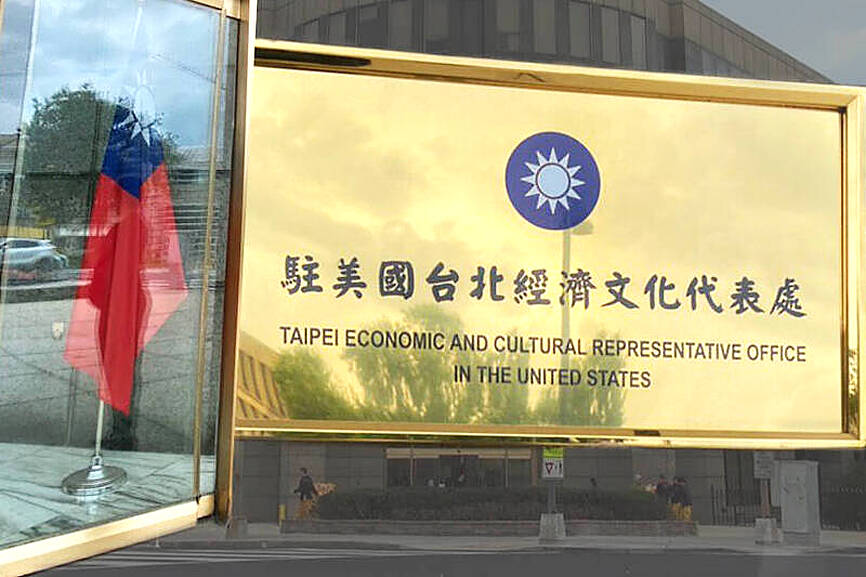Experts have expressed mixed opinions on a bipartisan US Senate proposal to rename Taiwan’s de facto embassy in Washington, with some praising its symbolic significance, while others warned of potential risks amid rising cross-strait tensions.
The bill, introduced on Wednesday, seeks to rename the Taipei Economic and Cultural Representative Office (TECRO) to the “Taiwan Representative Office” to better reflect “the reality” that it represents the people of Taiwan, according to its sponsors.
Republican US Senator John Curtis, who cosponsored the bill with Democratic Senator Jeff Merkley, said in a news release that the legislation “underscores the United States’ commitment to Taiwan’s democracy and enhances clarity in the US-Taiwan relationship.”

Photo: Taipei Times
In response to requests for comment, Global Taiwan Institute executive director Russell Hsiao (蕭良基) said there is hesitation within the policy community, and even among Taiwan supporters, to back what some view as symbolic gestures over more substantive measures.
“In my view, such criticisms are misplaced and symbolism has substance in the cross-strait context,” he said.
Meanwhile, Bonnie Glaser, director of the Indo-Pacific program at the German Marshall Fund, said that Taiwan should instead prioritize strengthening its defense and national security amid growing threats from China.
“I believe this is not the moment to focus on symbolic measures that could result in even more intense threats from Beijing,” she said.
Julian Ku (古舉倫), a Hofstra University law professor, said that while the bill enjoys broad congressional support, it may not be a legislative priority.
The proposal “seems more like a political issue related to what is going on in Congress right now, and my impression is that while there is broad support for a bill like this, it is just not very high on the agenda given all of the other priorities in Congress,” Ku said.
A name change does not require congressional approval — US Secretary of State Marco Rubio has the authority to approve it — but the timing remains uncertain amid upcoming US-China diplomatic engagements, Ku added.
Richard Bush, a Brookings Institution nonresident senior fellow, said that the final decision rests with US President Donald Trump.
While Rubio had previously introduced similar legislation as a senator, Bush said that his current role as secretary of state means the decision would ultimately be shaped by Trump’s broader China policy.
In 2023 and last year, similar bills were introduced in the US House and Senate, but failed to gain traction.
Curtis, then a House member, introduced one of the bills, while then-senator Rubio sponsored the other during former US president Joe Biden’s term.
Taiwan’s representative offices in countries with which it does not have diplomatic ties are typically named the Taipei Economic and Cultural Office or the Taipei Representative Office, in keeping with the host countries’ preference to avoid any references that would imply Taiwan is a separate country from China.
Since the severing of diplomatic ties between the US and Taiwan in 1979, Taiwan’s representative office in Washington has been referred to as TECRO.

Taiwan is stepping up plans to create self-sufficient supply chains for combat drones and increase foreign orders from the US to counter China’s numerical superiority, a defense official said on Saturday. Commenting on condition of anonymity, the official said the nation’s armed forces are in agreement with US Admiral Samuel Paparo’s assessment that Taiwan’s military must be prepared to turn the nation’s waters into a “hellscape” for the Chinese People’s Liberation Army (PLA). Paparo, the commander of the US Indo-Pacific Command, reiterated the concept during a Congressional hearing in Washington on Wednesday. He first coined the term in a security conference last

Prosecutors today declined to say who was questioned regarding alleged forgery on petitions to recall Democratic Progressive Party (DPP) legislators, after Chinese-language media earlier reported that members of the Chinese Nationalist Party (KMT) Youth League were brought in for questioning. The Ministry of Justice Investigation Bureau confirmed that two people had been questioned, but did not disclose any further information about the ongoing investigation. KMT Youth League members Lee Hsiao-liang (李孝亮) and Liu Szu-yin (劉思吟) — who are leading the effort to recall DPP caucus chief executive Rosalia Wu (吳思瑤) and Legislator Wu Pei-yi (吳沛憶) — both posted on Facebook saying: “I

Sung Chien-liang (宋建樑), who led efforts to recall Democratic Progressive Party (DPP) Legislator Lee Kun-cheng (李坤城), was released on bail of NT$80,000 today amid outcry over his decision to wear a Nazi armband to questioning the night before. Sung arrived at the New Taipei District Prosecutors’ Office for questioning in a recall petition forgery case last night wearing a red armband bearing a swastika, carrying a copy of Adolf Hitler’s Mein Kampf and giving a Nazi salute. Sung left the building at 1:15am without the armband and covering the book with his coat. Lee said today that this is a serious

A mountain blaze that broke out yesterday morning in Yangmingshan National Park was put out after five hours, following multi agency efforts involving dozens of fire trucks and helicopter water drops. The fire might have been sparked by an air quality sensor operated by the National Center for High-Performance Computing, one of the national-level laboratories under the National Applied Research Laboratories, Yangmingshan National Park Headquarters said. The Taipei City Fire Department said the fire, which broke out at about 11am yesterday near the mountainous Xiaoyoukeng (小油坑) Recreation Area was extinguished at 4:32pm. It had initially dispatched 72 personnel in four command vehicles, 16